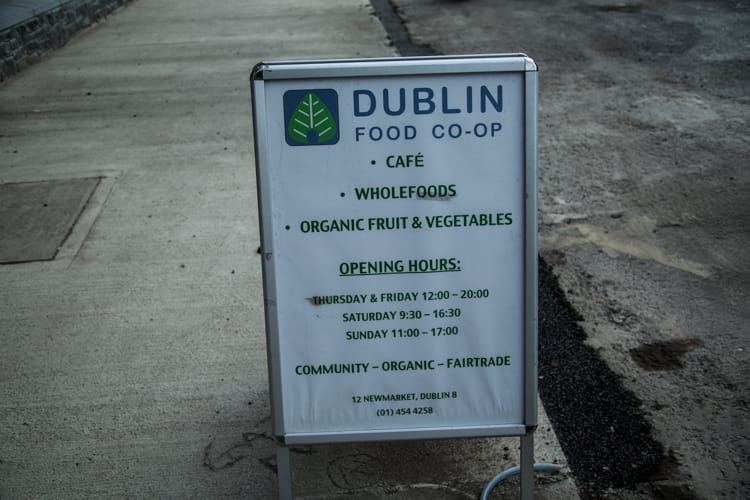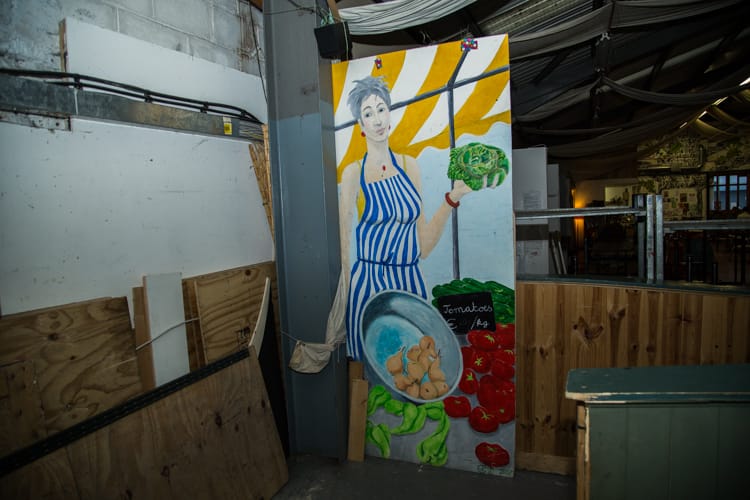Nobody caught illegally dumping yet by new north inner-city CCTV
But the scheme is a success, said a council official's report, as that shows the cameras are a deterrent.
At the Dublin Food Co-op in The Liberties, about 35 people turned up to chat about starting a housing co-op, as a way to get themselves an affordable – and democratic – home.

Joe Zefran casts his eyes over the rows of people sat in front of him.
“So, how many folks know what a housing co-op is, or has lived in a housing co-op?” he asks. A couple of people nod.
“Yeah!? Alright,” he says. He’s wearing khaki-green trousers and there’s a presentation projected on the painted-brick wall behind him; it feels like he’s giving a TED Talk.
In one row, there’s a woman in a black beret who lived in a housing co-op in the UK about 20 years ago, and has been trying to find her way back ever since. And there’s a skinny guy from the US, who’s passing through Ireland on holiday and fulfilling his duties under what he calls “P6”. That’s number six of the seven co-operative principles: co-operation among co-operatives.
It’s a Thursday evening at the Dublin Food Co-op in The Liberties and about 35 people have turned up to hear about Zefran’s plan to create a new housing co-operative – and to scout out whether they want to get involved.
Now seems like the perfect time to kick-start a housing co-op, Zefran said later. “Certainly with the housing crisis, if you will, it’s super-relevant now and people are yearning for it.”
People are looking around for ways to access stable, affordable housing, and some think that pooling their resources to buy a home through a co-op might be the answer.

On a basic level, housing co-ops are legal entities that own property. But they come in different shapes, sizes and models.
There are the swanky market-equity co-ops of the kind that might be found lining Central Park in New York. And there are the limited-equity set-ups – almost like non-profits – for which members put in a bit up front, pay a little every month, and get a small amount out at the end. The second is what Zefran is going for.
“It’s not really an investment, but it’s a stable, predictable cost throughout your time as a member,” Zefran explains.
Housing co-ops aren’t a new idea for Dublin.
In the late 1960s, a new generation of young families with modest incomes came together to form co-operative housing societies, boosted by a “hundred-pound site-scheme” which saw local authorities offering cheap land to co-opers who wanted to build their own houses. They’d share a builder, designer, architect costs and that kind of thing.
After a time, “once the houses were built, the co-ops essentially dissolved and people became, I suppose, standard homeowners,” says Geoff Corcoran, director of development at National Association of Building Co-operatives (NABCO).
NABCO was formed by those earlier co-opers to make sure that they had a voice when dealing with local authorities.
Later, in the mid-1980s, there was a shift in focus from people who could build houses from their own resources, to co-ops for those who couldn’t; NABCO followed that flow and focused its efforts on providing rental co-ops for those on the social-housing list.
As Corcoran sees it, the move by Zefran to set up a new housing co-op reminds him of 40 years ago. “I think it’s moving back to the original co-ops, which would have been ownership,” he said.
Barry Semple, from Radical Routes Ireland, agrees. A new group that’s taken it’s name from a sister network of cooperatives in the UK, Radical Routes Ireland has been trying to spread the word about co-ops here.
Semple had been thinking about co-ops for a long time, visiting Daft.ie housing listings, and doing back-of-the-envelope calculations to work out how many people would need to pay how much to be able to buy in.
He lives in what he calls a “prototype co-op” in Stoneybatter, with three other people. They pulled together savings and loans from parents to each pay their portion for the derelict building, he says.
What makes it a co-op, he says, is the vision, the community, and the stability of the rent. “We’re doing loads of work on renovating it, and we all work on that together,” he says. They cook together and generally live in a communal way.
They’re also united by the idea that treating somebody’s home as a way to extract wealth is a problem. And they’re “trying to confront that and address that as part of the bigger solution around housing,” Semple says.
Not everybody has the financial backing to set up in the way that he and his friends did, he says. “So, something I’ve been keen to do it to try to figure out how to make it really accessible for people who don’t have that.”
If you go to a bank in the UK and say you want to set up a housing co-op, they’ll generally know what you’re talking about, he said. “But here, they look at you like you’ve got ten heads.”
Ideally, Radical Routes Ireland will get a good handle on how to set up these things and be able to put together a booklet, a how-to guide, to smooth the path for other people. The planning-permission process, for example, was difficult to navigate, but they eventually figured it out, he said. That’s experience they can pass on.
Corcoran says there’s definitely a relearning process going on at the moment. “We’re trying to re-educate local authorities and the Department of the Environment and all that as to what the benefits of cooperative housing are.”
The Thursday-evening meet-up aimed to get people together and come up with an action plan for how to make a co-op happen. After an introduction, small groups split off into huddles to look into three questions: what, who and how?
In one side-room, with a couple of tables shoved together and an anti-GMO poster slumped against the wall, the “what” group shares their stories of why they came ;along and what they are looking for.
Johnny says he was looking for group-living on a farm outside of Dublin. Maybe in Wicklow, he says.
A girl with an asymmetrical haircut says she just came to learn. “I’ve been looking for an apartment to buy for the last two years; I gave up recently,” she says.
Next, a girl with a patterned scarf and curly hair pipes up. She has been in Dublin for eight years, is wondering whether to move out of Dublin because of the high rents, and feels like she’s working for her landlord.
“My time is precious and I feel like and I’m giving half my weekly salary. That is too much,” she says. “It’s not acceptable anymore.”

For many at the meet-up, the desire to live in a co-op isn’t entirely about money; it’s a lifestyle choice.
The girl with the curly hair says she’s conscious that living alone, she creates more pollution. If she moves in with other folks, she’ll feel happier about her footprint.
Another guy says he wants the community and neighbourhood feel of co-op life: “I think it’s a much stronger way, to, rather than buy a house and live in a location, to be part of something bigger and interact with your neighbours.”
In the hour that follows, they try to figure out might be out there and what kind of set up people might want. Vegetarian, vegan, or activist-based? Shared rooms? Individual units? Could they do self-build houses?
They divvy up tasks: looking at pre-1963 buildings that might be unrentable as separate units, but not to a co-op; NAMA stock; or searching out developers who might have property that – for legal or other reasons – they’re struggling to make use of.
In the other room, the “who” and “how” groups are trying to pin down what skills they have among them – carpentry, yoga, grant-writing, graphic-design and others – and could teach each other, and how they might pull together the financing they’ll need.
So far, it’s early days. Some folks are looking at whether they can work out long-term lease arrangements, and get something set up within months. But it might take as long as three years to actually make their full-fledged co-op a reality, Zefran said.
The main challenge facing Zefran’s potentially future co-op mates will likely be the finance.
There are a few ways that the city council, or even TDs, could chip in and help smooth the path for plans like this, thinks Zefran.
If city council had a more pro-active eminent domain policy, scooping up spaces which landowners have sat on for years and offering them for co-ops, it would be useful, he said. “That’s a way the city can help.”
TDs on the other hand, could change policy to help housing co-ops get easier access to financing,. “They’re a sustainable model and should have a social-good premium attached,” Zefran added.
It might seem a long way off, but “what we are a building here is hopefully going to last for 100 years, so our timeline is a little different,” he said. “We’re playing the long game.”